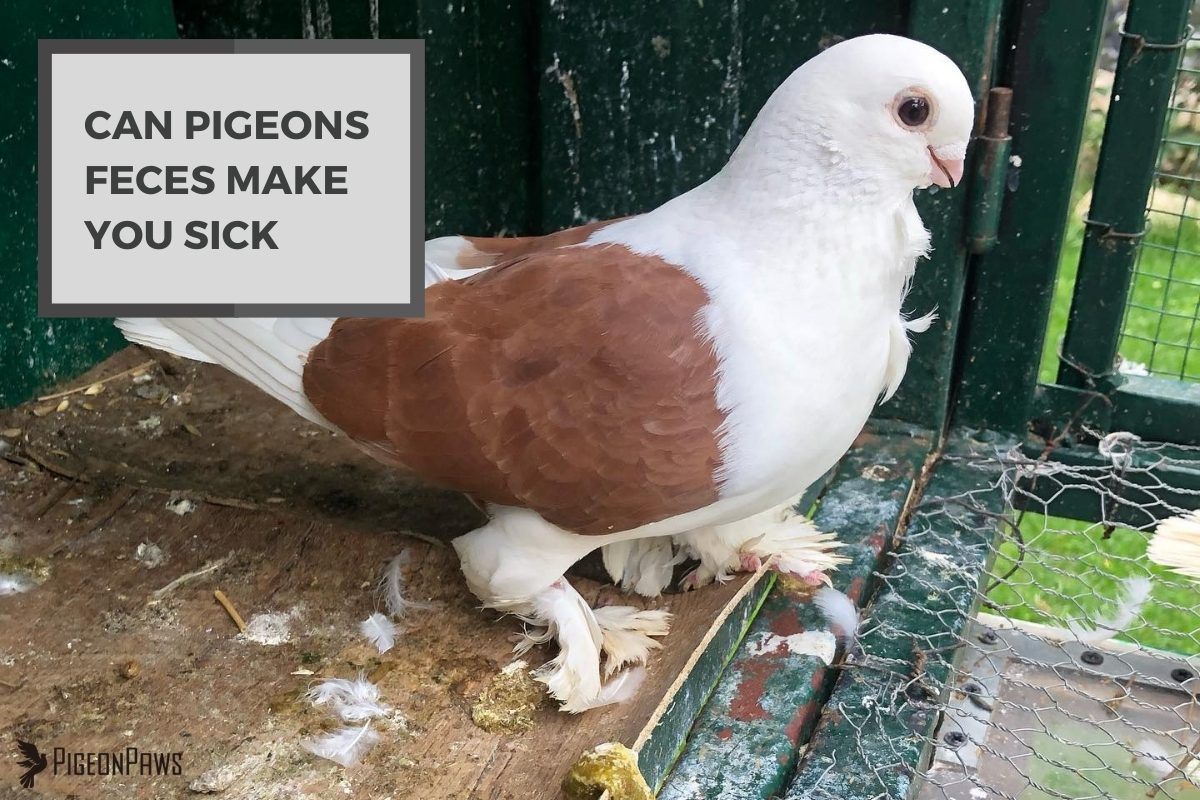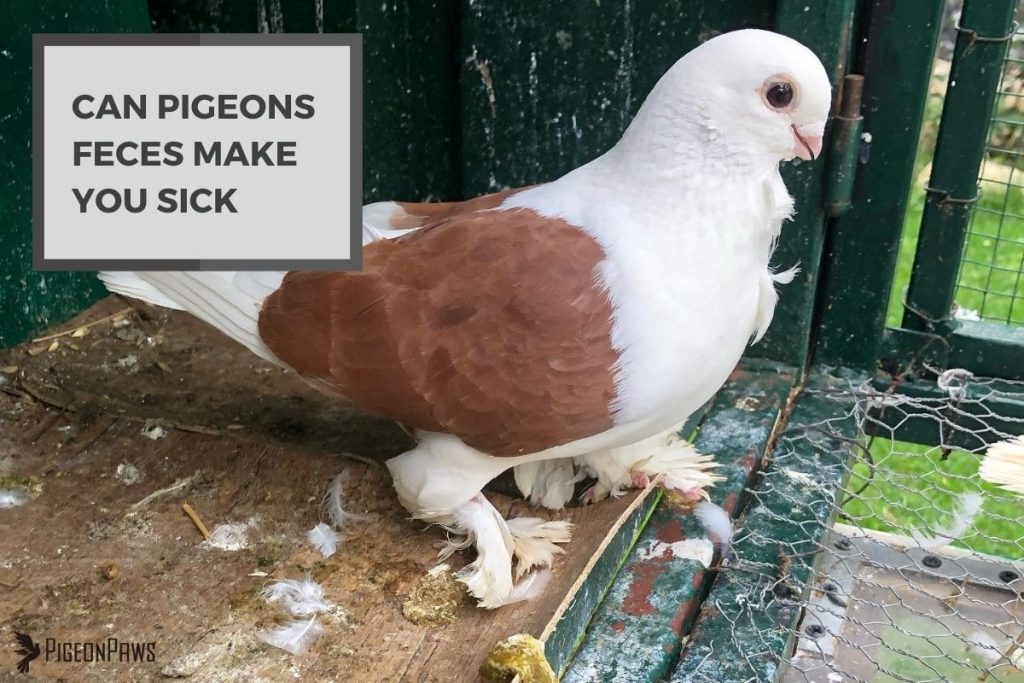Can Pigeons Feces Make You Sick? The Hidden Health Threats

Pigeons are common in many urban areas, and their droppings can be found on sidewalks, buildings, and even people. While it may seem harmless, pigeon feces can pose a severe health threat.
Pigeon droppings can make you sick. Pigeon droppings can spread various diseases, including salmonella, Cryptococcus, and psittacosis. These diseases can be spread through direct contact with the droppings or through breathing in particles from dried droppings.
In this informative article, learn exactly how pigeon feces can make you sick and what steps to take to protect yourself.

What Type Of Human Illnesses Are Spread By Pigeon Feces?
Pigeon feces can contain a variety of harmful microorganisms, including bacteria, viruses, and fungi. When these microorganisms come into contact with humans, they can cause a range of illnesses, from minor skin and respiratory infections to more severe conditions such as encephalitis and meningitis.
- One of the most common diseases associated with pigeon feces is histoplasmosis, a fungal infection that can cause flu-like symptoms such as fever, cough, and chest pain.
- Another potential risk is psittacosis, a bacterial infection that can cause pneumonia-like symptoms, such as fever, chills, and muscle aches.
- In addition to these specific diseases, exposure to pigeon feces can also aggravate pre-existing respiratory conditions such as asthma, making them more challenging to manage.
You might become sick with these illnesses by inhaling the dust formed when cleaning droppings. Pigeon-related disorders are quite rare. People with weakened immune systems are especially vulnerable to these illnesses.
Why is Pigeon Poop Toxic?
Pigeon poop is considered to be toxic for a variety of reasons. Primarily, this is due to the bacteria, parasites, and fungi that can be present in the droppings. Along with these microorganisms, the droppings also contain high ammonia levels, which can damage humans when inhaled.
The high nitrogen levels in the droppings can also cause damage to vegetation and corrode any metal surfaces that the droppings come in contact with.
Furthermore, pigeon droppings have been known to contain a variety of diseases, including salmonella and E. coli, which can be dangerous to humans if ingested. All these factors combined make pigeon poop a hazard to humans and the environment in which it is found.
Are Pigeons Harmful to Humans in Ways Other Than Their Feces?
Understanding pigeon behavior for coexistence is crucial when considering their potential harm to humans beyond their feces. Pigeons can cause damage to structures through their nesting habits and scratching. Moreover, their gathering in large numbers can create noise pollution and obstruct walkways. By comprehending their behavior patterns, we can find ways to peacefully coexist with these ubiquitous birds.
How do people get sick from pigeon droppings?
Pigeon droppings, like other bird droppings, can contain a variety of microorganisms that may pose health risks to humans. Here are some ways in which people can get sick from pigeon droppings:
- Direct Contact: This can happen when cleaning up droppings or working in an area where droppings are present, such as in a park or on a construction site.
- Inhaling Dust or Spores: It happens when cleaning up droppings or working in an area where droppings are present, and the droppings have dried and turned into dust.
- Ingestion: This can happen when food or water is stored or prepared in an area where droppings are present or contaminated with droppings during transit.
How Can You Protect Yourself from the Risks of Pigeon Feces?
Protecting yourself from the risks of pigeon feces is essential, as exposure can lead to various health issues. Here are some ways to protect yourself:
Wearing Personal Protective Equipment (PPE)
When cleaning up pigeon droppings, it is essential to wear appropriate PPE, such as a face mask or respirator, gloves, goggles, and clothing that covers your body.
Washing Hands and Cleaning Exposed Skin
It’s essential to wash your hands and clean any exposed skin before eating, drinking, or touching your mouth. If you’re feeding or handling birds, wash your hands afterward.
Avoiding Direct Contact
Two good ways to avoid direct contact with pigeon feces include wearing disposable gloves and clothes that can be washed after cleaning. Other protective clothing like disposable coveralls, boots, and respirators can also be used.
Avoiding Disturbing Droppings
Disturbing material with a large amount of bird or bat poop can release tiny particles into the air called spores, which can cause serious infections called Histoplasmosis or Cryptococcosis.
Cleaning Up Safely
It’s essential to soak the material with water or a wetting agent to keep dust and spores down, use a HEPA vacuum to clean up the contaminated material, dispose of the waste in 6-ml disposal bags, and follow the disposal procedures outlined in your company’s health and safety policy.
Using Netting
Bird netting along sheds, eaves, and rafters can protect your outbuildings from pigeons and prevent them from taking shelter near your garden. Additionally, some people add bird netting over raised beds or around crops they want to protect.
Generally, it’s essential to be aware of the risks associated with pigeon feces and take the necessary precautions to protect yourself. If you are cleaning up many droppings, it may be best to hire a professional company specializing in handling hazardous waste.
Conclusion
Understanding the risks that pigeon feces can pose to human health is essential. If not appropriately managed, pigeon droppings may contain various harmful bacteria and fungi, which can cause respiratory, gastrointestinal, and skin issues in humans.
To protect yourself from the risks of pigeon droppings, it is crucial to ensure that areas where pigeons may be present, are appropriately sanitized and disinfected.
It is also essential to avoid contact with pigeon feces and wear appropriate protective clothing, such as face masks and gloves when handling the droppings.
By taking these steps, it is possible to minimize the risks of health problems associated with pigeon feces.

